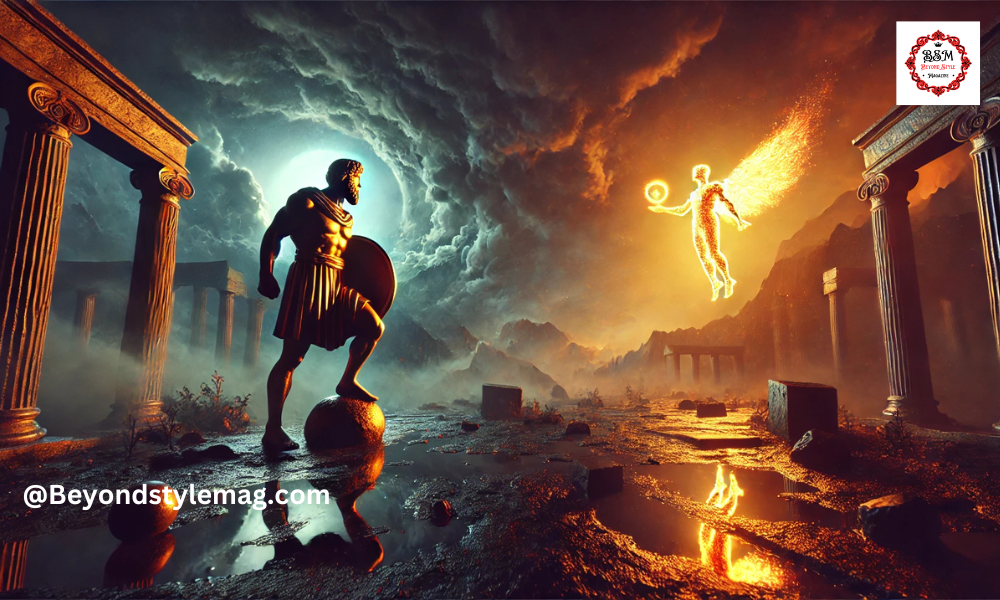Introduction To Unexpected Pre-scene Passion: Atlas Eros
The phrase “unexpected pre-scene passion: Atlas Eros” sounds intriguing. It combines deep emotion with mystery. The term “unexpected pre-scene passion” suggests strong feelings that appear suddenly before a major event or scene. This emotion surprises both characters and audiences. It adds excitement and energy to a story.
“Atlas Eros” seems connected to love and strength. The word “Atlas” often represents endurance and responsibility. “Eros” relates to love and desire. Together, “Atlas Eros” could symbolize powerful emotions or a character who carries deep passion. This connection creates a strong theme of love and emotional tension before important moments.
In stories, such passion can change how characters act. It can lead to dramatic actions or decisions. The mix of surprise and strong feelings keeps audiences engaged. The phrase “unexpected pre-scene passion: Atlas Eros” perfectly captures this emotional energy.
The Concept Of Pre-scene Passion In Literature And Media
Pre-scene passion in stories shows deep emotions before major events. This feeling can be love, anger, or desire. It surprises characters and changes the story. Writers use this to make scenes more exciting.
In literature, authors build tension before big moments. A sudden romantic feeling or hidden anger can change what happens next. This makes the story more powerful. In media, films and shows use close-ups, music, and silence to show strong emotions before important scenes.
The significance of this emotion is huge. It makes the audience feel closer to characters. It creates suspense and makes the next scene more dramatic. The phrase “unexpected pre-scene passion: Atlas Eros” shows how surprise emotions can change a story’s direction. This makes the story more emotional and engaging.
Analyzing ‘atlas Eros’: Themes And Interpretations
“Atlas Eros” appears to be a story filled with deep emotions and powerful themes. The name combines two strong ideas: “Atlas” represents strength and burden, while “Eros” symbolizes love and desire. This mix suggests a storyline where love becomes a heavy responsibility or where passion drives the characters’ actions.
In the story, the main character may struggle with carrying emotional weight while experiencing unexpected feelings. This conflict creates intense drama. The “unexpected pre-scene passion” could lead the character to make surprising choices, changing the course of the story.
The central themes in “Atlas Eros” likely explore love, sacrifice, and emotional tension. Passion and anticipation drive the plot forward, making the story exciting and engaging. This emotional buildup keeps the audience interested, waiting for what happens next. The connection between love and responsibility makes “Atlas Eros” rich in meaning and full of emotional depth.
The Role Of Unexpected Passion In Character Development
Unexpected passion plays a big role in shaping characters. Sudden emotions can change how a character thinks, feels, and acts. These feelings push them to make decisions they might not have made before. This change makes the character more interesting and real.
In “Atlas Eros”, the main character might feel a sudden, strong love or desire. This emotion could force them to choose between duty and passion. For example, a hero might risk everything for someone they love, even if it puts their mission in danger. This struggle makes the character more human and relatable.
Other stories also show how unexpected passion changes characters. In “Romeo and Juliet”, the characters fall in love quickly. Their passion leads to risky choices and a tragic ending. In “The Great Gatsby”, Gatsby’s deep love for Daisy drives him to chase a dream that cannot come true.
In “Atlas Eros”, this kind of passion adds depth and complexity. It helps the audience understand the character’s heart and mind. It also makes the story more exciting and emotional.
Comparative Analysis: ‘Atlas Eros’ And Similar Works
The theme of unexpected pre-scene passion appears in many powerful stories. These emotions surprise characters and change the course of events. “Atlas Eros” explores this idea deeply, blending love, desire, and responsibility.
In “Atlas Eros”, sudden passion likely forces characters into hard choices. This intense feeling creates conflict and moves the story forward. The mix of strength (Atlas) and love (Eros) adds weight to these emotional moments.
Similar stories explore this theme. In “Wuthering Heights”, Heathcliff’s hidden love for Catherine leads to anger and revenge. His sudden emotions drive the plot and affect every character. In “Jane Eyre”, Jane’s love for Mr. Rochester appears suddenly and challenges her beliefs. This passion shapes her growth.
Comparing these stories to “Atlas Eros”, all show how sudden feelings create deep conflict. However, “Atlas Eros” may focus more on the struggle between emotional passion and personal duty. This balance makes it unique. While other works highlight love or revenge, “Atlas Eros” blends passion with responsibility, adding more depth to the story.
This comparison shows how unexpected pre-scene passion can make stories more emotional and engaging, especially in “Atlas Eros”.
The Impact Of Anticipation On Audience Engagement
Anticipation is a powerful tool in storytelling. It keeps the audience curious and emotionally involved. When readers or viewers sense that something important is about to happen, they become more focused and eager to know what’s next. This emotional build-up increases excitement and strengthens their connection to the story.
Psychologically, anticipation activates the brain’s reward system. The mind starts imagining possible outcomes, creating suspense. When a story introduces unexpected pre-scene passion, this effect becomes stronger. Sudden emotions surprise the audience and break their expectations. This twist makes scenes more thrilling and memorable.
In “Atlas Eros”, moments of sudden passion likely catch the audience off guard. These emotional shifts can make characters seem more real and relatable. They also heighten tension, making key scenes more impactful. For example, a character showing unexpected love or anger right before a major event can change how the audience feels about that moment.
This emotional surprise keeps the audience engaged. It deepens their interest and makes them care about the characters’ choices. In “Atlas Eros”, the mix of unexpected pre-scene passion and anticipation makes the story more exciting and emotionally powerful.
Techniques For Writing Effective Pre-scene Passion
Writing effective pre-scene passion requires building strong emotions before important moments. This creates tension and keeps readers engaged. Authors can use several techniques to make these emotions feel real and powerful.
Slow Reveal of Emotions:
- Let emotions grow gradually. Show small signs of passion before the big moment. This builds suspense and makes the feeling more intense.
Use Inner Conflict:
- Show the character struggling with their feelings. This internal battle makes sudden passion more believable. In “Atlas Eros”, a character might fight between duty and desire, making the passion feel stronger.
Foreshadowing:
- Drop hints early in the story about upcoming emotions. Small details can prepare readers for an emotional shift. This makes the unexpected pre-scene passion feel natural but still surprising.
Descriptive Language:
- Use vivid descriptions to show emotions. Describe how a character feels physically and mentally. This pulls readers into the moment.
Sudden Action:
- Let passion lead to immediate actions. A quick decision or bold move can shock both the character and the audience. This technique adds excitement to the story.
Successful Examples:
In “Pride and Prejudice”, Mr. Darcy’s sudden confession of love surprises Elizabeth and changes the story’s direction. In films like “Titanic”, Jack and Rose’s unexpected kiss before danger adds emotional weight.
In “Atlas Eros”, using these techniques can make unexpected pre-scene passion feel real and powerful. These emotions can drive the story and connect deeply with the audience.
Conclusion
The idea of unexpected pre-scene passion is a strong force in storytelling. It surprises characters and readers, creating emotional depth and excitement. In “Atlas Eros”, sudden feelings of love, desire, or conflict drive the story forward. These emotions make characters more human and relatable.
Throughout the analysis, we explored how unexpected pre-scene passion shapes character development, builds anticipation, and engages the audience. It forces characters to make difficult choices and adds tension before key scenes. Stories like “Wuthering Heights”, “Pride and Prejudice”, and films like “Titanic” use similar emotions to create memorable moments.
The lasting appeal of sudden passion lies in its ability to shock and connect. It keeps readers and viewers emotionally invested. In “Atlas Eros”, this mix of passion and responsibility makes the story powerful and unforgettable. The surprise of raw emotions will always capture hearts and minds, making stories richer and more engaging.
FAQ’s:
What Does “Unexpected Pre-Scene Passion” Mean In Storytelling?
It refers to sudden, strong emotions that appear before a key scene, surprising characters and the audience. This builds suspense and makes the story more exciting.
What Is The Main Idea Of “Atlas Eros”?
“Atlas Eros” likely explores themes of love, desire, and responsibility. It focuses on how unexpected emotions affect characters and their choices.
Why Is Unexpected Passion Important In Stories?
It adds depth to characters and creates tension. Sudden emotions can change the story’s direction, making it more engaging and emotional.
How Can Writers Create Strong Pre-Scene Passion?
Writers can build suspense with slow emotional reveals, inner conflict, vivid descriptions, and sudden actions that surprise readers.
Can You Give Examples Of Unexpected Passion In Other Stories?
Yes! In “Pride and Prejudice”, Mr. Darcy’s sudden love confession surprises Elizabeth. In “Titanic”, Jack and Rose’s unexpected romance adds emotional depth.
If you found this article helpful, visit my website to read more articles like this.

